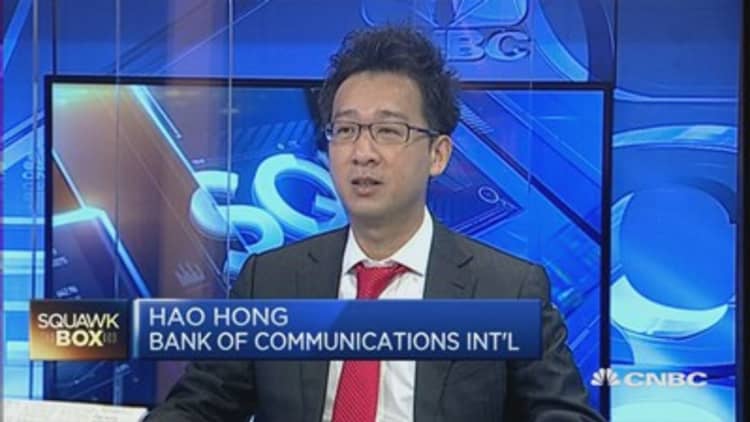
China stocks have surged by nearly 40 percent in just over a month, shrugging off signs of a slowing economy, but valuations look stretched and a violent correction may be on the way, analysts said.
"We are entering into a very volatile consolidation period," Hao Hong, chief strategist at Bank of Communications International, told CNBC. "The markets have risen for more than 300 days without a 10 percent correction, the longest time period in Chinese stock market history," he added.
Shanghai's stock market has been indefatigable this year. Even after the more eight percent sell-off since Tuesday, the is up 27.1 percent so far this year, compared with the MSCI Asia ex-Japan's 10.8 percent rise and Emerging Market index's 7.2 percent gain since the beginning of the year.
Even self-confessed China stock "perma bull," Morgan Stanley, is now worried. On Thursday, it cut its rating on China stocks to neutral after keeping an overweight call for more than seven years.
"China's dramatic recent outperformance has driven a deterioration in absolute and relative valuations and a worsening technically overbought situation," the firm said in a note published on Thursday. While its base case is for the Shanghai A-share market to remain stuck in a range, it sees a "clear risk" of a sharp correction.
Stretched valuations
In an effort to put the recent rally in perspective, analysts have been looking at the last Shanghai bull market back in 2007, a re-rating that dwarfed the current rally, with the Shanghai Composite tapping its all-time high of 6,124 in October of that year.
In that light, the current price-to-earnings ratio of 22 times is still less than half the 49 times hit at its peak in October 2007 and even the ratio of 29 times earnings seen in August 2009, Capital Economics said in an April 29 note.
However, those highs were reached "against the backdrop of much more rapid economic growth in China (and elsewhere in the emerging world) than we are seeing today," said the note.
China's government has set an economic growth target of 7 percent in 2015. In 2007, the economy grew by 14.2 percent and by 9.2 percent in 2009.
With the economy slowing down, the earnings outlook does not support aggressive valuations, analysts said.
Return on equity has sunk to 13.7 percent, the lowest level since 2008-2009, during the Global Financial Crisis, and earnings per share are only expected to grow by 2 percent next year, according to Morgan Stanley.
The firm's base case scenario "suggests only 5 percent upside from current levels."

